Corpus linguistic exploration of Russian-Vietnamese mutual perceptions
Despite long-term fruitful relations between Russia and Vietnam, there is still a need for studies that would deepen intercultural understanding between the two peoples. In this paper, Russian-Vietnamese mutual perceptions are analyzed relying on corpus linguistic methods. Data collection was conducted in the course of a preceding study aimed at the reconstruction and investigation of mutual representations of the Russian and Vietnamese peoples through experimentally obtained ethnic portraits and self-portraits of the two respective nations. Here, the empirical data of the collected data is further deeper examined by corpus linguistic tools (Sketch Engine, Atlas.ti). In order to gain a more comprehensive picture of the two nations’ mutual and self-perceptions, Russian-Vietnamese pairs of characteristics were identified and semantically contrasted to Russian and Vietnamese reference corpora as common parts of mutual perceptions. Connotational differences of the studied characteristics were identified, analyzed, and categorized and unique traits of the Russian and Vietnamese mutual and self-perceptions were identified and investigated. Collocations and thesauri of the relevant characteristics were examined, complemented by the corpus-based analysis of the two nations’ perceptions. The obtained results suggest that the Top-10 most typical common traits of mutual and self-perceptions of the two peoples comprise noteworthy semantic differences. The research confirmed the effectiveness of the complementary application of the questionnaire-based and the corpus linguistic methods. It is concluded that the combination of qualitative and quantitative approaches gives a more comprehensive picture of how the ethnic portraits and self-portraits are reflected in languages and cultures.
Figures
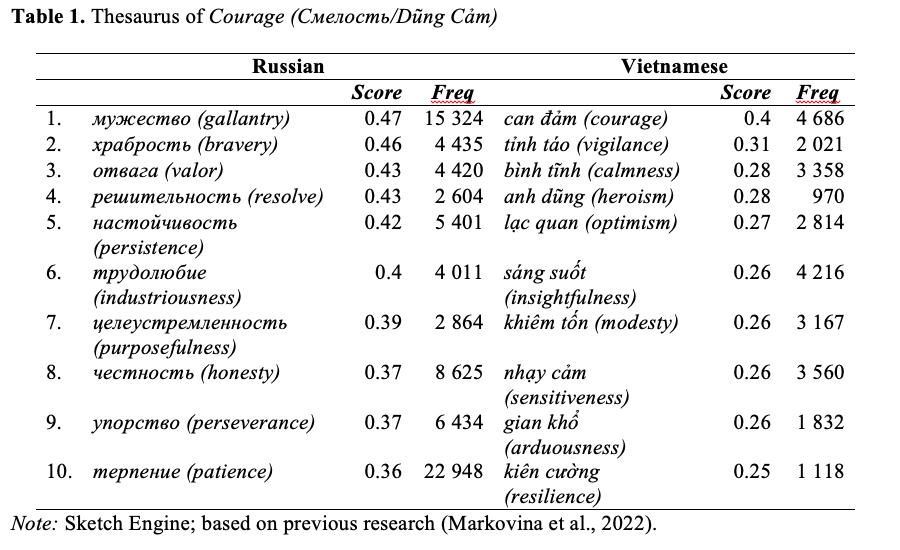
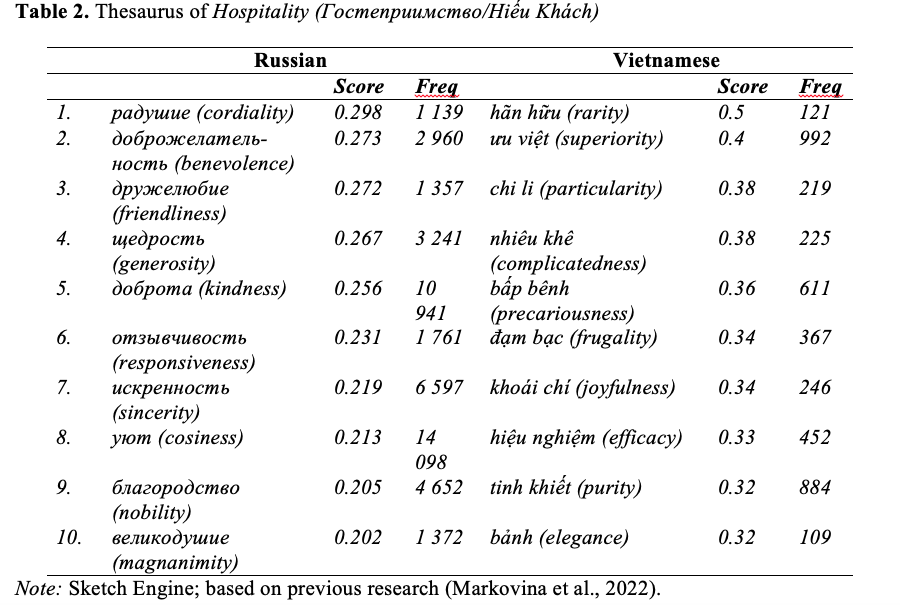
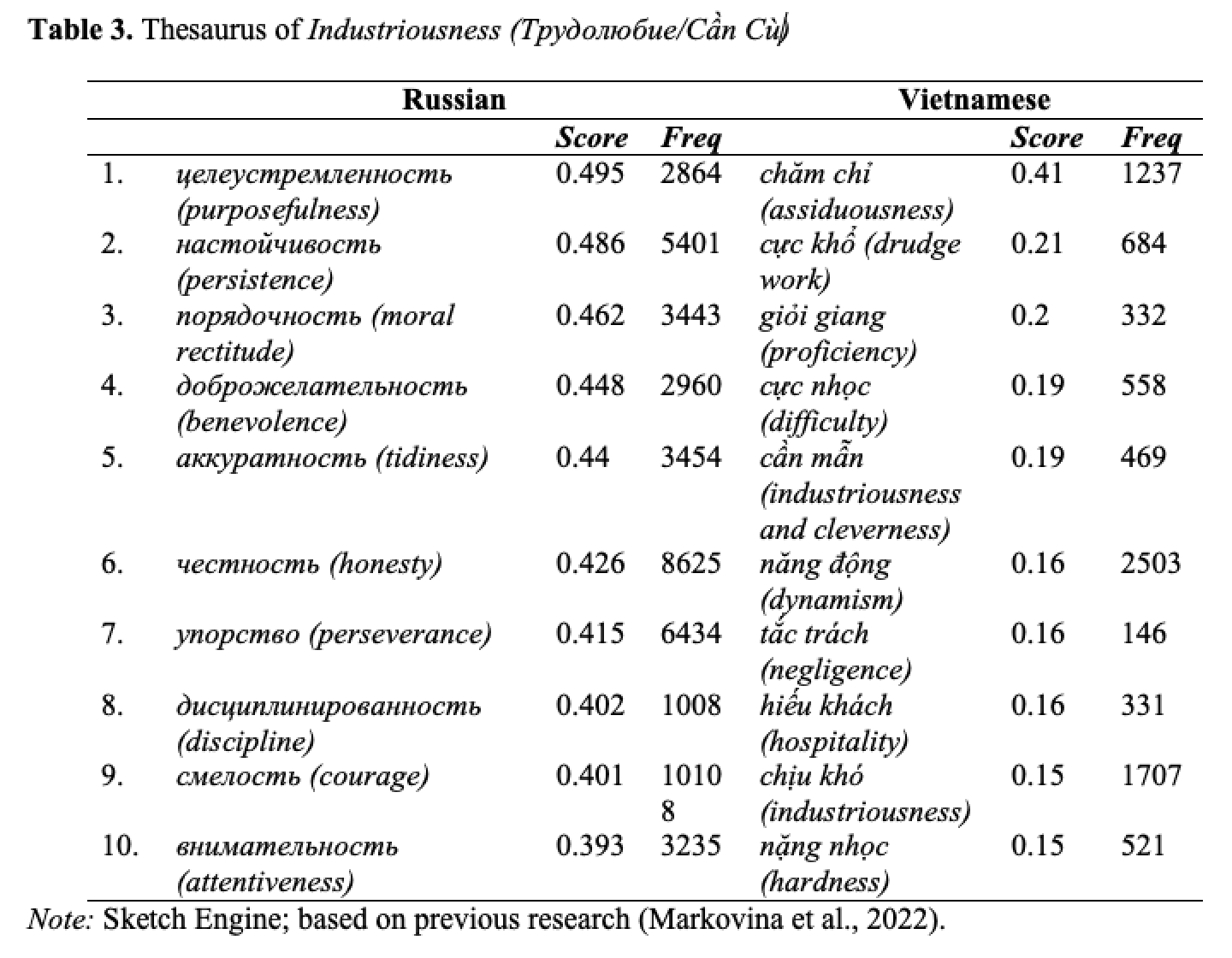
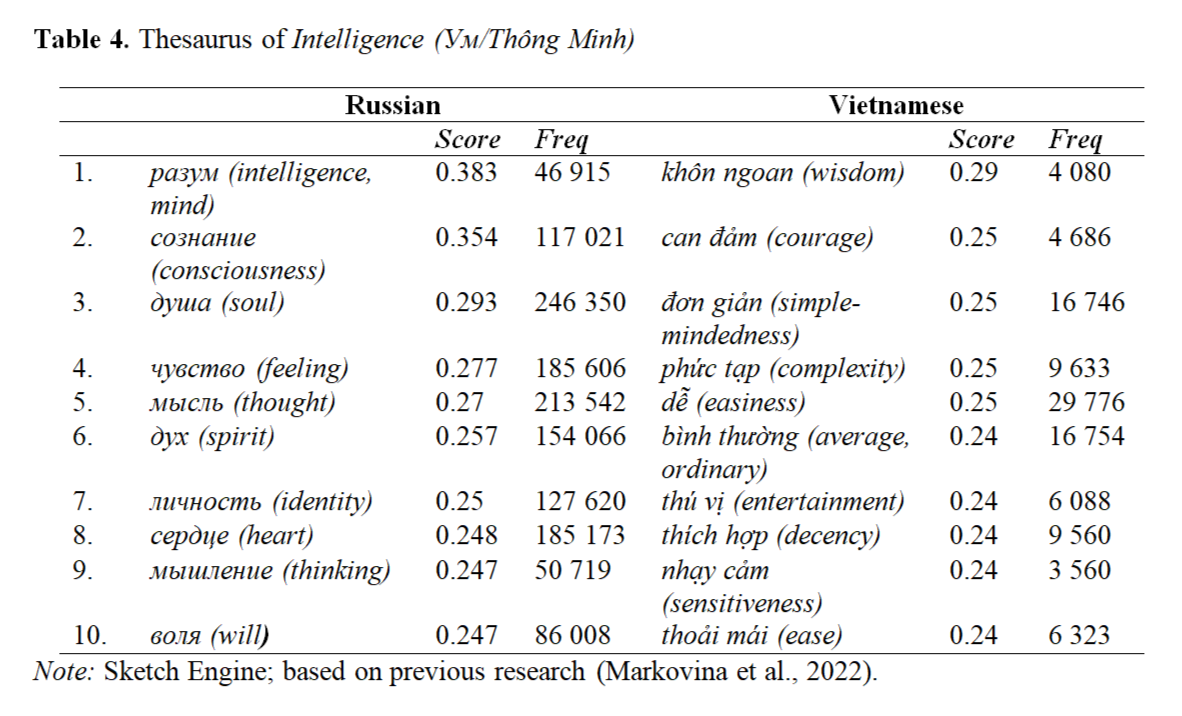
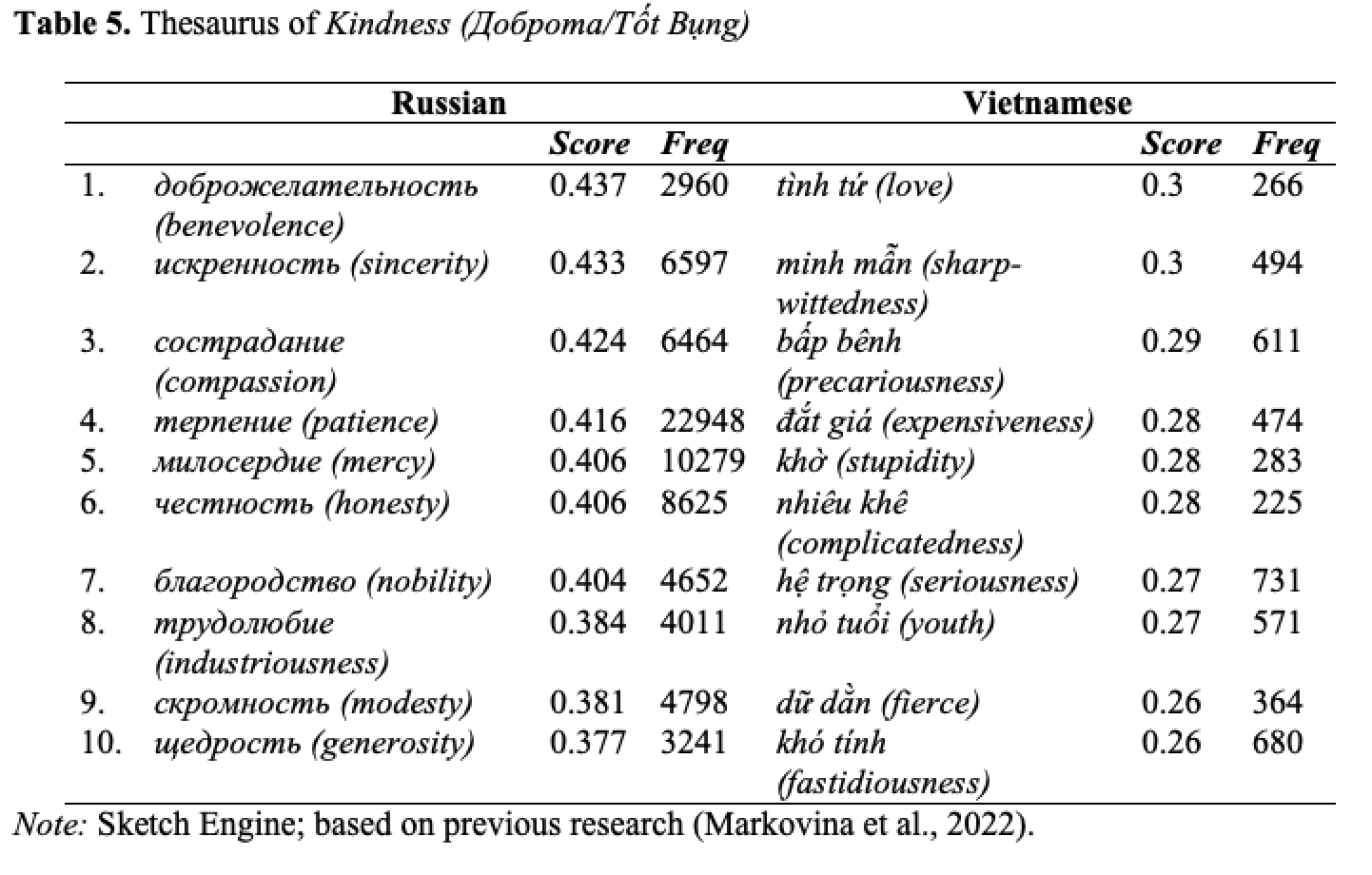
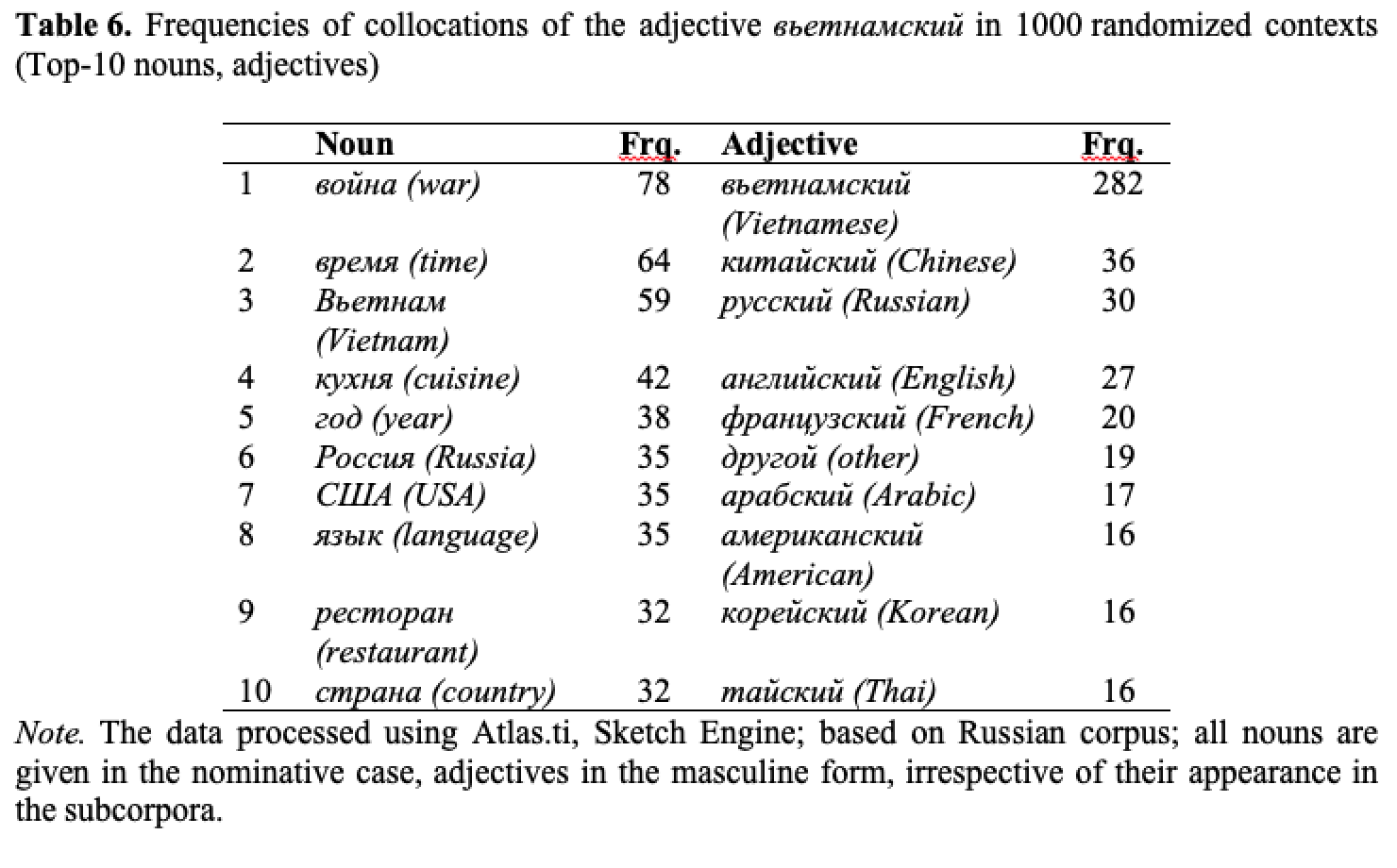
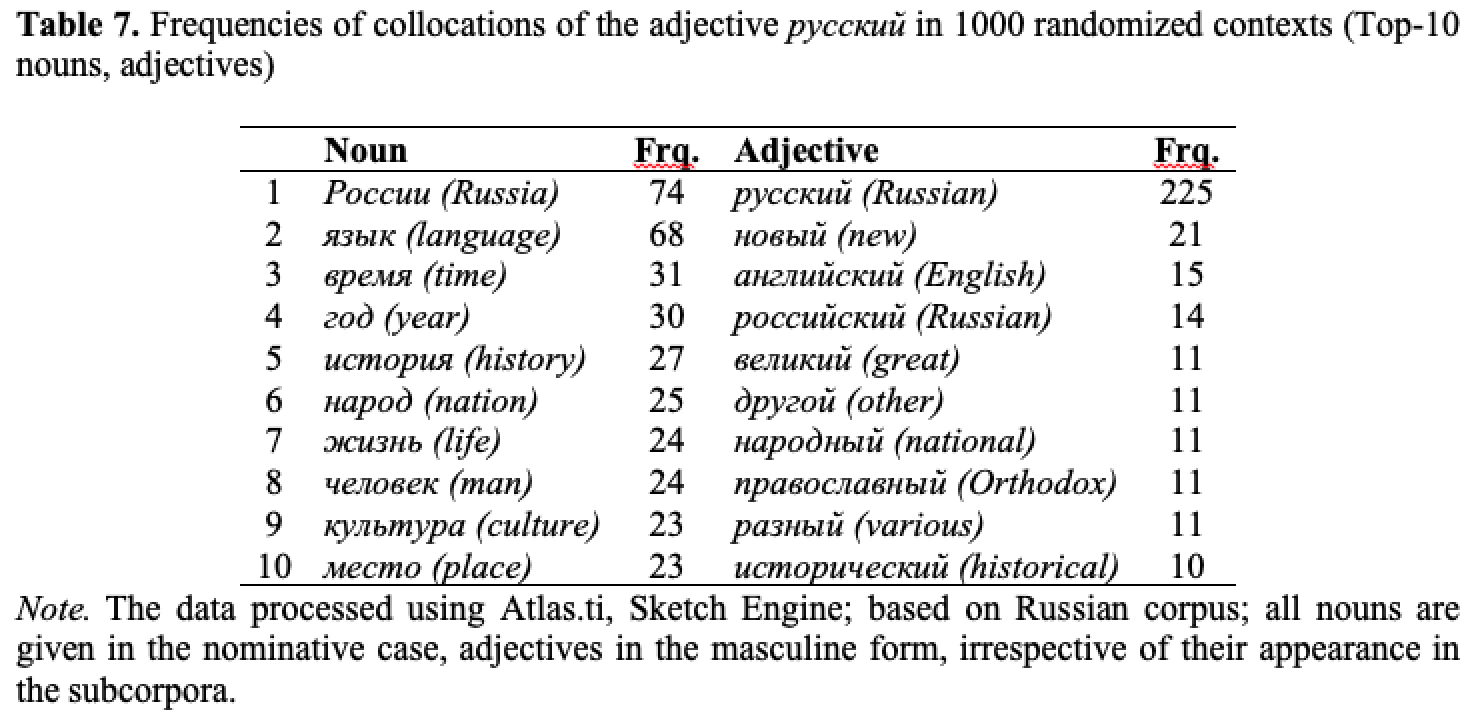


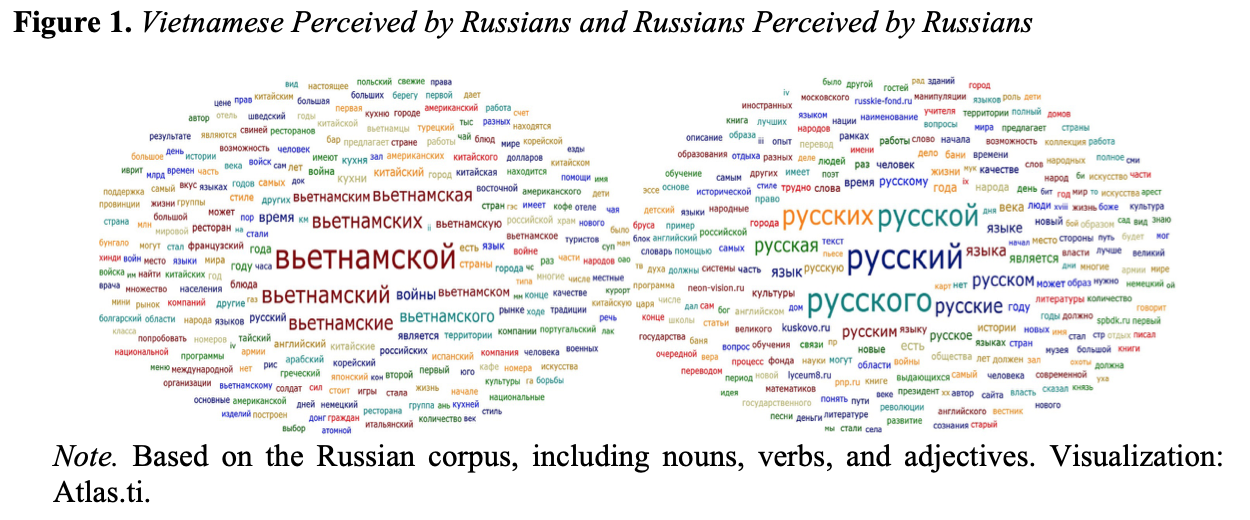

Markovina, I. Yu., Matyushin, A. A., Lenart, I., Nguyen, V. H. and Pham, H. (2024). Corpus linguistic exploration of Russian-Vietnamese mutual perceptions, Research Result. Theoretical and Applied Linguistics, 10 (1), 94-114. DOI: 10.18413/2313-8912-2024-10-1-0-6


















While nobody left any comments to this publication.
You can be first.
Adler, N. J. (1993). Competitive Frontiers, International Studies of Management & Organization, 23 (2), 3–23. (In English)
Baker, C. (2014). Stereotyping and women's roles in leadership positions, Industrial and Commercial Training, 46 (6), 332–337. (In English)
Duy, N. T. T. (2021). Educating Students on Traditional Cultural Values of Vietnamese People, South Asian Research Journal of Humanities and Social Sciences, 3 (5), 309–314. (In English)
Endres, K. W. (2015). Constructing the Neighbourly “Other”: Trade Relations and Mutual Perceptions across the Vietnam–China Border, Sojourn: Journal of Social Issues in Southeast Asia, 30 (3), 710–741. (In English)
Gablasova, D., Brezina, V. and McEnery, T. (2017). Collocations in corpus-based language learning research: Identifying, comparing, and interpreting the evidence, Language Learning, 67 (S1), 155–179. (In English)
Ge, Y. (2022). The linguocultural concept based on word frequency: correlation, differentiation, and cross-cultural comparison, Interdisciplinary Science Reviews, 47 (1), 3–17. (In English)
Houghton, S. A, Lebedko, M. and Li, S. (2013). Comparing Stereotypes of Chinese Japanese and Russian People: Mutual Perceptions of Students from Neighbouring Countries, in Houghton, S. A, Furumura, Y., Lebedko, M. and Li, S. (eds.), Critical Cultural Awareness: Managing Stereotypes through Intercultural (Language) Education, Cambridge Scholars Publishing, Newcastle upon Tyne, UK, 62-85. (In English)
Hunston, S. (2022). Corpora in applied linguistics, Cambridge University Press, UK. (In English)
Jisi, W., Sun, Y., Lu, N., Guo, C., Li, F., Jiao, J. and Xu, B. (2020). Summary of survey report on mutual perceptions between China and the United States, China International Strategy Review, 2, 24–35. (In English)
Jones, C. and Waller, D. (2015). Corpus linguistics for grammar: A guide for research, Routledge, Abingdon, UK. (In English)
Kilgarriff, A, Rychly, P, Smrz, P. and Tugwell, D. (2004). Itri-04-08 the SketchEngine, Proceedings of Euralex, Lorient, France, 105–116. (In English)
Laruelle, M. (2021). Russia and Central Asia: Evolving mutual perceptions and the rise of postcolonial perspectives, in Isaacs, R. and Marat, E. (eds.), Routledge Handbook of Contemporary Central Asia, Routledge, Abingdon, UK. (In English)
Leonard, S. P., Ufimtseva, N. V. and Markovina, I. Yu. (2019). Language, consciousness and culture: some suggestions to develop further the Moscow school of psycholinguistics, Language and culture, 47, 111–130. (In English)
Leontiev, A. A. (1993). Jazikovoje soznanie i obraz mira [Language consciousness and the image of the world], in Vasilevich, A. P., Zimnyaya, I. A., Leontiev, A. A. (eds.), Yazyk i soznanie: Paradoksalnaya ratsionalnost [Language and consciousness: Paradoxical rationality], Institute of Linguistics, Moscow, Russia, 16–21. (In Russian)
Leybina, A. V. and Kashapov, M. M. (2022). Understanding Kindness in the Russian Context, Psychology in Russia. State of the Art, 15 (1), 66–82. (In English)
Markovina, I., Lenart, I., Matyushin, A. and Pham, H. (2022). Russian-Vietnamese mutual perceptions from linguistic and cultural perspectives, Heliyon, 8 (6), e09763. (In English)
Markovina, I. Yu., Matyushin, A. A., Lenart, I. and Pham, H. (2021). Perception of Russians and Vietnamese by Russian respondents: an experimental study, Journal of Psycholinguistics, 2 (48), 74–85. (In Russian)
Markovina, I. Y., Matyushin, A. A. and Lenart, I. (2023). HOSPITALITY FROM THE RUSSIAN AND VIETNAMESE PERSPECTIVES: WEB CORPORA ANALYSIS, Synergy of Languages & Cultures 2022: Interdiscipilinary Studies, 316-322. https://doi.org/10.21638/2782-1943.2022.26(In English)
McEnery, T. and Hardie, A. (2011). Corpus Linguistics: Method, Theory and Practice (Cambridge Textbooks in Linguistics), Cambridge University Press, Cambridge, UK. (In English)
Mollov, B. and Lavie, Ch. (2016). The Impact of Jewish-Arab Intercultural Encounters and the Discourse of the Holocaust on Mutual Perceptions, in Pandey, K. (ed.), Promoting Global Peace and Civic Engagement through Education, IGI Global, Hershey, USA. https://dx.doi.org/10.2139/ssrn.913736(In English)
Moon, R. (2010). What can a corpus tell us about lexis?, in McCarthy, M. and O'Keeffe, A. (eds.), The Routledge handbook of corpus linguistics, Routledge, Abingdon, UK, 197–211. (In English)
Muratbekova-Touron, M. (2011). Mutual perception of Russian and French managers, TheInternational Journal of Human Resource Management, 22 (8), 1723–1740. (In English)
Nguyen, C. H. (2021). Vietnamese Students' Perceptions of Moral Values: An Assessment by Students at An Giang University, Universal Journal of Educational Research, 9 (11), 1814–1825. (In English)
Oelsner, A. (2003). Two Sides of the Same Coin: Mutual Perceptions and Security Community in the Case of Argentina and Brazil, in Laursen, F. (ed.), Comparative Regional Integration. Routledge, UK. (In English)
Prokohorov, Yu. E. and Sternin, I. A. (2006). Russians: communicative behavior, Flinta, Moscow, Russia. (In Russian)
Rebechi, R. R. (2013). Corpus-driven Methodology for Exploring Cultural References in the Areas of Cooking, Football and Hotel Industry, Procedia – Social and Behavioral Sciences, 95, 336–343. (In English)
Rychlý, P. (2008). A lexicographer-friendly association score, in Sojka, P. and Horák, A. (eds.), Proceedings of recent advances in Slavonic natural language processing, RASLAN Masaryk University, Brno, Czechia, 6–9. (In English)
Rozumko, A. (2012). Cross-cultural aspects of contrastive studies: the discourse of fact and truth in English and Polish. A corpus-based study, in Rozumko, A. (ed.), Directions in English-Polish Contrastive Research, Wydawnictwo Uniwersytetu w Białymstoku, Białystok, Poland. (In English)
Saaler, S., Kudo, A. and Tajima, N. (2017). Mutual Perceptions and Images in Japanese-German Relations, 1860-2010, in Brill's Japanese Studies Library, Vol. 59. Brill. Leiden, Netherlands. (In English)
Seo, E. H. and Lee, J. (2019). The Study of Koreans’ Perception about Vietnam using Social Big Data, The Journal of the Korea Contents Association, 19 (3), 1–9. (In English)
Sorokin, Y. A. (1994). Ethnic conflictology, Russian Lyceum, Samara, Russia. (In Russian)
Stewart, R., Wright, B., Smith, L., Roberts, S. and Russel, N. (2021). Gendered stereotypes and norms: a systematic review of interventions designed to shift attitudes and behavior, Heliyon, 7 (4), e06660. (In English)
Stubbs, M. (1996). Text and corpus analysis, Blackwell, Oxford, UK. (In English)
Stubbs, M. (2006). Corpus analysis: the state of the art and three types of unanswered questions, in Geoff Thompson, in Hunston, S. (ed.), System and Corpus: Exploring Connections, Equinox, London, UK, 15–36. (In English)
Tarasov, Y. F. (1996). Jazikovoje soznanije – perespektivi issledovanija [Language consciousness – research perspectives], Etnokulturnaja spetsifika yazykovogo soznaniya [The ethnocultural specificity of language consciousness], Institute of Linguistics, Moscow, Russia, 7–22. (In Russian)
Tho, N. N. (2016). Confucianism and humane education in contemporary Vietnam, International Communication of Chinese Culture, 3 (4), 645–671. (In English)
Thu, T. N. M., Thi, T. D. V., Thuy, N. T. and Huy, D. T. N. (2021). Confucianism Theories and Its Influence on Vietnam Society, Ilkogretim Online, 20 (4), 1434–1437. (In English)
Tognini-Bonelli, E. (2001). Corpus Linguistics at Work, John Benjamins Publishing. Amsterdam/Philadelphia. (In English)
Ufimtseva, N. V. (1996). Russkije: Opit estche odnogo samopoznanija [The Russians: An attempt at one more self-knowledge], Etnokulturnaya spetsifika yazykovogo soznaniya [The ethnocultural specificity of language consciousness], Institute of Linguistics, Moscow, Russia, 139–162. (In Russian)
Vaičenonienė, J. (2001). Using corpora to obtain social and cultural information: A case study of America, Kalbų Studijos, 1, 6–9. (In English)
The reported study was funded by the Russian Foundation for Basic Research (RFBR) and the Vietnam Academy of Social Sciences (VASS), project number 21-512-92001\22.